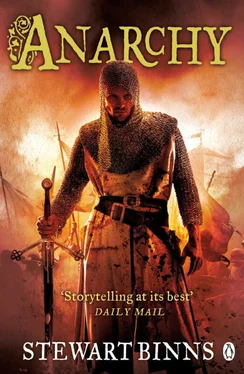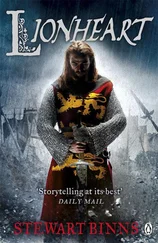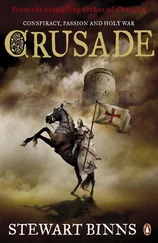It was a near-run thing. I summoned a small escort of only a dozen knights. Maud and Greta barely had enough time to change their clothes. As Otto and Berenger helped the ladies on to their mounts, Eadmer grabbed the royal seals, the keys to the Treasury and King Edward’s crown, while I ran to the gates of the palace to check the situation up the hill at Charing. Robert had formed up his knights to block the road, but men armed with an array of weapons were already streaming through the fields on either side to outflank them. The mob seemed to be hundreds strong, if not thousands. Miles, Ranulf, Brien and their escorts formed another cordon at the gates of the palace, but the crowds just washed around them like waves over pebbles on the seashore.
With Otto and Berenger flanking the women, Eadmer took the rear and I led the vanguard as we rode through the west gate of the palace with only minutes to spare. We kept close to the river, but even before we reached the Manor of Neate – within a stone’s throw from the palace – we could hear the frenzied cries of the mob and the dreadful sounds of the wanton destruction behind us.
We rode most of the night and were safely inside the walls of Oxford Castle late the following afternoon. As soon as Robert joined us, we tried to make sense of what had happened. Miles and Ranulf had rushed back to their castles, but Miles sent word – based on rumours he had heard while at Westminster – that it was a plot which had been many weeks in the hatching.
Robert sat Maud down and gave her his interpretation.
‘Bishop Henry has changed horses again. After Winchester, when he thought you could be easily manipulated, he was happy to endorse you. But after you denied him and Mathilde their petitions, he changed his mind. London turned against you as soon as you stood up to them – again, they thought you would be a malleable Dowager Queen for many years until Henry was of an age.
‘Much the same applies to the earls and landowners. They don’t mind a queen, as long as she doesn’t act like a king. That mob from London had been worked into a frenzy; purses of silver and free barrels of ale would have been at the back of that. I wager that every ne’er-do-well in the burgh would have been recruited. I saw stevedores with billhooks, young farmers wielding pitchforks, and even apprentice masons brandishing their mallets.’
Robert had voiced what was now obvious to all of us.
Maud did not seem angry or disappointed – rather, she remained determined.
‘Well, whether they like it or not, this Queen is going to fight like a king for what is right. How quickly can we gather an army?’
‘To what end?’
‘To march on Winchester.’
‘Is that wise?’
‘It may not be. But I intend to make Bishop Henry pay for his duplicity!’
Robert looked at me, clearly concerned. He was no doubt hoping that I would advise Maud to be cautious.
‘Maud, it may be wise to go back to Gloucester and assess the situation from there–’
‘I know it’s a risk. But if we can snare Henry and put him where Stephen is, it will send a clear message that I will not be denied.’
Maud’s strategy was bold; it was dangerous, but it could be a vital blow. Henry’s duplicity was there for all to see. Maud had every right to challenge him.
Robert nodded his approval.
Maud smiled at us both.
‘Thank you, Gentlemen; let’s go and snatch victory from the jaws of defeat!’
Robert, who was always up for a fight, quickly warmed to the idea.
‘I will ride to Bristol and bring more men. I will also send word for Ranulf, Miles and Brien to join us. Let us agree to meet at Andover on the fourth Sunday in July.’
Maud donned her campaigning clothes for the attack on Winchester, which we launched on 31 July 1141. She rode out at the front of the column, her hair flowing in the wind. She refused armour, but wore a thick leather jerkin similar to the ones used by archers. Under the jerkin she had a heavy woollen smock and wore cavalrymen’s leggings and boots. Otto and Berenger flanked her and had strict instructions to get her to the rear of the column at the first hint of danger.
She was a great inspiration to the men, and I tried to think of a precedent. I could come up with only one warrior queen in our history – a figure from the distant past that my mother had told me about – Queen Boudicca, widow of Prasutagus, King of the Iceni, one of the ancient tribes who had fought the Romans.
Robert, Brien, Miles, Ranulf and I rode behind her in line abreast, leading over 100 knights and almost 1,000 infantry and archers. Eadmer carried my colours and Robert’s standard-bearer held Maud’s new colours. She had chosen them as monarch, a variation on mine: three golden lions rampant, one each for England, Normandy and Anjou, on a gules field. Her colours symbolized everything about her.
We had three objectives at Winchester: the burgh, where the Treasury was located; the old castle, to the west within the burgh’s walls; and Bishop Henry’s new castle, Wolvesey, on the eastern side of the settlement. When we arrived from the west, we found the city gates open and were able to ride in with ease. But as we did so, we saw that Bishop Henry had broken into the Royal Treasury and emptied it. He and his entourage had then escaped to the east, leaving his garrison to defend his episcopal castle. It was a well-built fortification, and we prepared for a long siege.
The castellan of the old fortress, built in the time of Maud’s grandfather, readily opened its gates to us, and we made it our base for the assault on Wolvesey. I also asked Eadmer to organize patrols to see if they could track down Bishop Henry.
Two days later, early in the morning, we woke with the smell of acrid smoke in our nostrils and the sound of anguished screams in our ears. Maud and I reached the window of our chamber together. We looked out over Winchester and all we could see were plumes of black smoke rising from the burgh, peppered with spits of bright flame.
Eadmer started to bang on the door.
‘ Hurry! Henry’s men are burning the burgh. They slunk out of the castle under cover of darkness, throwing flaming brands everywhere.’
It was a frightening scene. People were running in all directions, some already consumed by flames ignited by the intense heat. Buildings close to those already ablaze seemed to burst into flame spontaneously, giving the unfortunate people in the streets between them no chance of escape from the inferno.
Thankfully, we were safe behind the stone perimeter of our fortified position, but most of the burgh of Winchester was destroyed; all that remained intact were the two stone-built fortresses and the cathedral.
People started to leave before dusk that day; by the afternoon of the next day, the burgh was a deserted and charred shell.
It was a callous act; Bishop Henry had ordered the burning of his own burgh. But it was also astute. He had denied us shelter for the army, provisions for men and horses, and entertainment in the taverns and whorehouses.
I called an urgent meeting of our High Command.
‘If we make camp outside the walls of the burgh, we will have no protection from attack. If we choose to stay within the walls, we will have to begin to clear the ground immediately.’
There was a consensus: we had to camp within the walls and continue the siege of Wolvesey. We began the task in earnest, but it was a frustrating process. All we could do was proceed with the tactics of attrition.
We sealed the fortress and began the long patient wait of siege warfare.
Two weeks later, with the siege still in its early days, Eadmer’s sentries, still searching for Bishop Henry, reported that the roads around Winchester were blockaded by the men of Mathilde and William of Ypres.
Читать дальше












